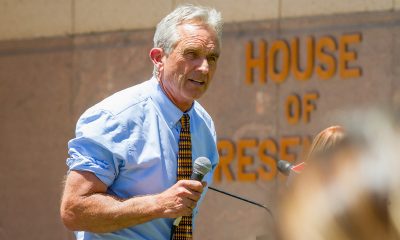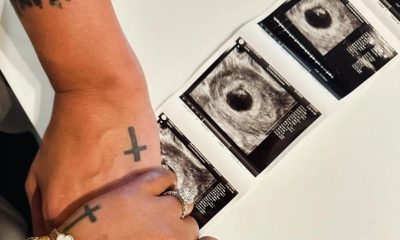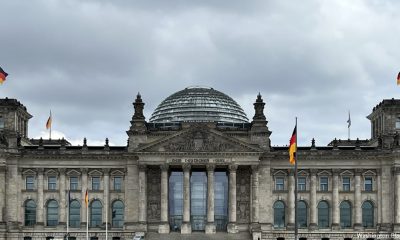Eastern Europe
Ukraine LGBTQ activists strongly condemn Russia invasion
Kyiv Pride urges supporters to defend country
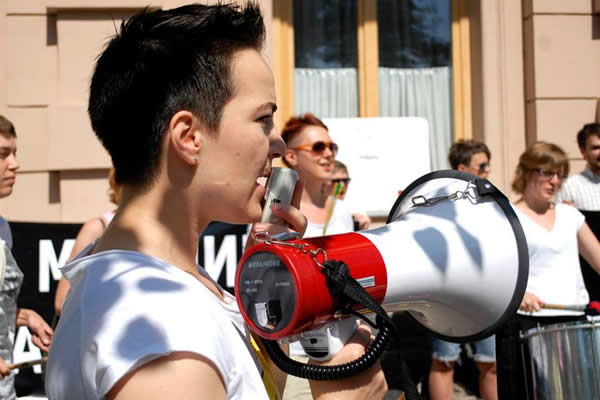
LGBTQ activists in Ukraine spoke on Thursday strongly condemned Russia’s invasion of their country.
Kyiv Pride in a tweet urged their supporters around the world to “call on your governments to stand up and to take action against the war in Ukraine.”
“We need to stop it now, we need to show how powerful we are all together, and Putin will stand no chance,” said Kyiv Pride.
Kyiv Pride in another tweet it wrote in Ukrainian mocked Russian President Vladimir Putin.
“We have left the past to which (Putin) seeks to draw us far behind,” said Kyiv Pride. “We are a country that has chosen the values of human rights, humanity, life and personality. Putin lives in the past.”
Ми залишаємося сильними, нас не залякати. Путін поламає всі зуби, намагаючись нас вкусити. Ми залишили далеко позаду те минуле, до якого він прагне нас затягнути. Ми – країна, що обрала цінності прав людини, людяності, життя, особистості. Путін живе у минулому, там йому й місце.
— KyivPride (@KyivPride) February 24, 2022
Activists in Kyiv, the Ukrainian capital, with whom the Washington Blade spoke after the invasion began said they are scared.
Helen Globa, co-founder of Tergo, a support group for parents and friends of LGBTQ Ukrainians, said she saw “clouds of black smoke” and heard “bombs exploding” and the “sounds of planes.”
“(It’s) scary, damn it,” said Globa.
Olena Shevchenko, chair of Insight, another Ukrainian LGBTQ rights group, echoed Globa.
“It’s bombing all around,” said Shevchenko from Kyiv. “We hear explosions.”
Ruslana Panukhnyk, a Kyiv-based LGBTQ activist, told the Blade that she is now in the capital’s suburbs because “there were a lot of explosions this morning.”
“As of now everything is silent near the place I am staying, but my friends in the city are noticing some blast sounds and planes flying over the city,” said Panukhnyk. “We are closely following the situation and it looks like Russian troops are invading from all directions, except the Western one.”
Shevchenko sent to the Blade a video from Kharkiv, Ukraine’s second-largest city that is less than 30 miles from the Russian border in the eastern part of the country, that appears to show a Russian airstrike. Shevchenko also provided pictures of damaged buildings in Mariupol, a port city that is near the self-proclaimed Donetsk People’s Republic that Russia has now recognized as an independent country.
Sphere, a Kharkiv-based LGBTQ rights group, on Wednesday in a post to its Facebook page said the “escalation of Russian aggression in eastern Ukraine currently has an unprecedented impact on vulnerable groups, including the LGBT+ community.” Nash Mir, another Ukrainian advocacy organization, also has offices in Kharkiv, Odessa and other cities across the country.
“As we have written, this war is not about dividing the spheres of influence,” said Nash Mir in a statement it posted to its Facebook page on Thursday. “This war is a war of civilizations. The Free World opposes the Russian world, freedom and democracy oppose its traditional values.”
“Propaganda and protection of these ‘traditional values,’ among which homophobia occupies anan honorable place, is a direct aid to the Russian world,” stressed Nash Mir. “This is the ideological justification of the Russian aggression. This is a direct assistance to our mortal enemy.”
“This is the time for Ukrainian advocates of these values to decide on which side they are,” it added.
Advocacy groups outside of Ukraine have also condemned the invasion.
“We stand with the brave people of Ukraine,” tweeted Tbilisi Pride in Georgia.
🇺🇦🇺🇦 We stand with the brave people of Ukraine.
Наша повна підтримка хороброго українського народу. Хай живе вільна Україна!#StandWithUkraine #СлаваУкраїні
— Tbilisi Pride (@TbilisiPride) February 24, 2022
ILGA-Europe echoed these sentiments.
“Like everyone, we woke this morning with shock and regret to hear of the invasion of Ukraine,” it said. “We will play our part to support and stand with everyone in Ukraine, Russia and the entire region who works towards peace and democracy, and to support those who are made even more vulnerable.”
Like everyone, we woke this morning with shock & regret to hear of the invasion of Ukraine. We will play our part to support & stand with everyone in Ukraine, Russia and the entire region who works towards peace & democracy, and to support those who are made even more vulnerable pic.twitter.com/ypdBkj8Erv
— ILGA-Europe (@ILGAEurope) February 24, 2022
Rainbow Railroad, a Canada-based organization that assists LGBTQ refugees around the world, said it is “alarmed by the attack on Ukraine and are concerned about the impact this conflict will have on Ukraine’s LGBTQI+ community.”
“We are preparing, in consultation with our partners, possible ways we can help people at risk in the region,” said a Rainbow Railroad on Thursday.
Rainbow Railroad is alarmed by the attack on Ukraine and are concerned about the impact this conflict will have on Ukraine’s LGBTQI+ community. We are preparing, in consultation with our partners, possible ways we can help people at risk in the region.https://t.co/vLW7nSdTaz
— Rainbow Railroad (@RainbowRailroad) February 24, 2022
Eastern Europe
LGBTQ Ukrainians bear brunt of psychological toll amid ongoing war
Saturday marks two years since Russia invaded country
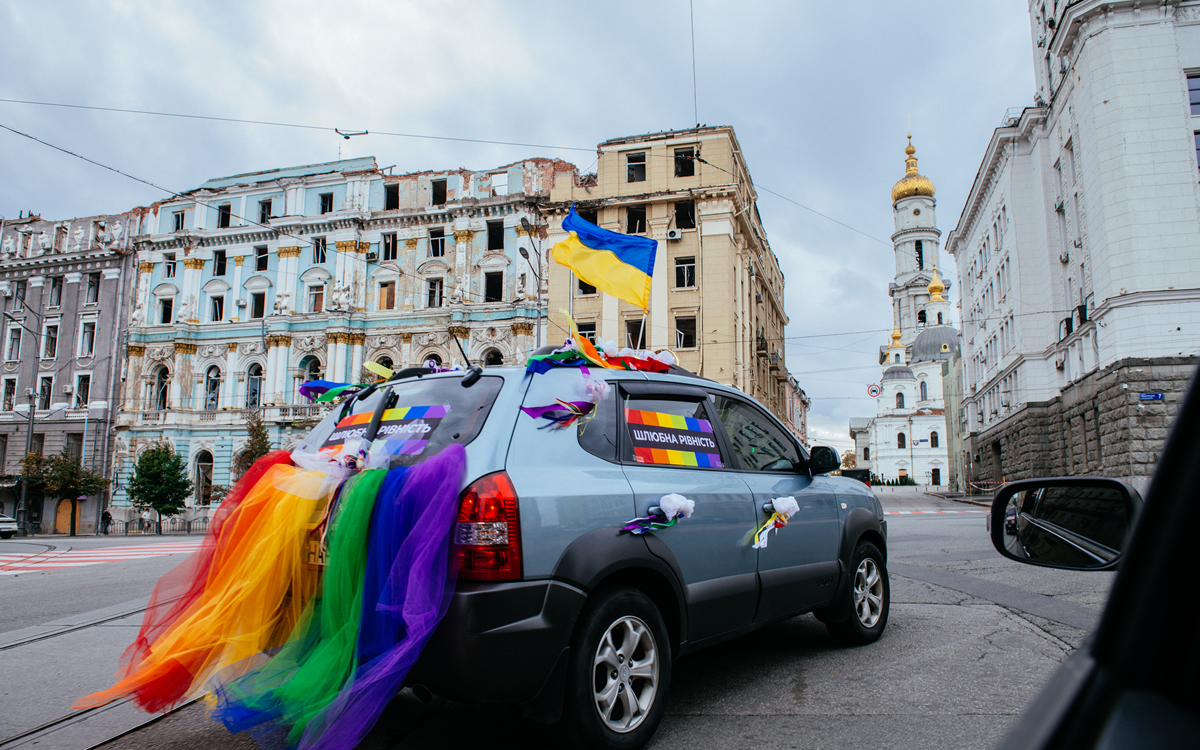
As Ukraine weathers Russian missile attacks and endures a harsh winter, the psychological consequences on its LGBTQ community are emerging as a distressing and often overlooked aspect of the conflict.
Recent reports from Human Rights First, based on their visits to the northeastern Ukrainian region of Kharkiv, shed light on the profound emotional impact experienced by LGBTQ individuals amid the sustained Russian aggression.
Saturday marks two years since Russia’s full-scale invasion of Ukraine began. Throughout this time, Human Rights First has sought to bring human rights into the heart of the discussion surrounding the conflict, offering support to human rights defenders, activist organizations, and individuals profoundly affected by the war.
Human Rights First last November initially surveyed Kharkiv to understand how communities were preparing for the harsh winter. Returning last month they found the LGBTQ community faced not only the physical challenges of extreme temperatures but also the hidden harm of severe psychological distress.
Human rights defenders on the forefront were documenting war crimes and supporting marginalized communities, including LGBTQ individuals. They emphasized the critical need for specialized psychological support within this community.
Vasyl Malikov, a key figure in Kharkiv-based LGBTQ NGOs Alliance.Global and Spectrum Women’s Association in Kharkiv, spoke about the increasing requests for psychological assistance and counseling.
Malikov highlighted the urgent need for both psychologists and a more comprehensive education about mental health and trauma issues.
“Some counseling can be done online, and it’s better than nothing, but what’s really needed is face-to-face time with a psychologist. Of course, that’s resource-intensive,” Malikov said, underscoring the unique challenges faced by the LGBTQ community.
Associate Professor Taras Zhvaniia, collaborating with Alliance.Global, shared insights into the growing demand for psychological support within the LGBTQ community. Initially addressing trauma in children, the scope expanded to include adults grappling with anxiety, depression and other emotional challenges related to the ongoing conflict.
Zhvaniia detailed the psychological struggles unique to the LGBTQ community, ranging from anxiety and panic attacks to specific fears such as reluctance to sleep in beds at home, avoiding bomb shelters and apprehension about routine activities during shelling.
Efforts to increase psychological knowledge for the general population are underway, yet the escalating demand for LGBTQ-focused support outpaces available resources. Human rights defenders have proposed measures, including funding for online counseling and visits by foreign psychologists, specifically tailored to address the psychological impact on the LGBTQ community.
The silent struggle faced by the LGBTQ community in Kharkiv and beyond necessitates international attention, according to Human Rights First. The organization added the lack of adequately trained psychologists raises concerns about the unaddressed psychological impact, underscoring the urgency for U.S. officials and the international community to comprehend and respond to the unique challenges faced by LGBTQ individuals in the midst of the ongoing conflict.
Eastern Europe
LGBTQ community in Kharkiv braces for another winter at war
Ukrainian city is 30 miles from Russian border
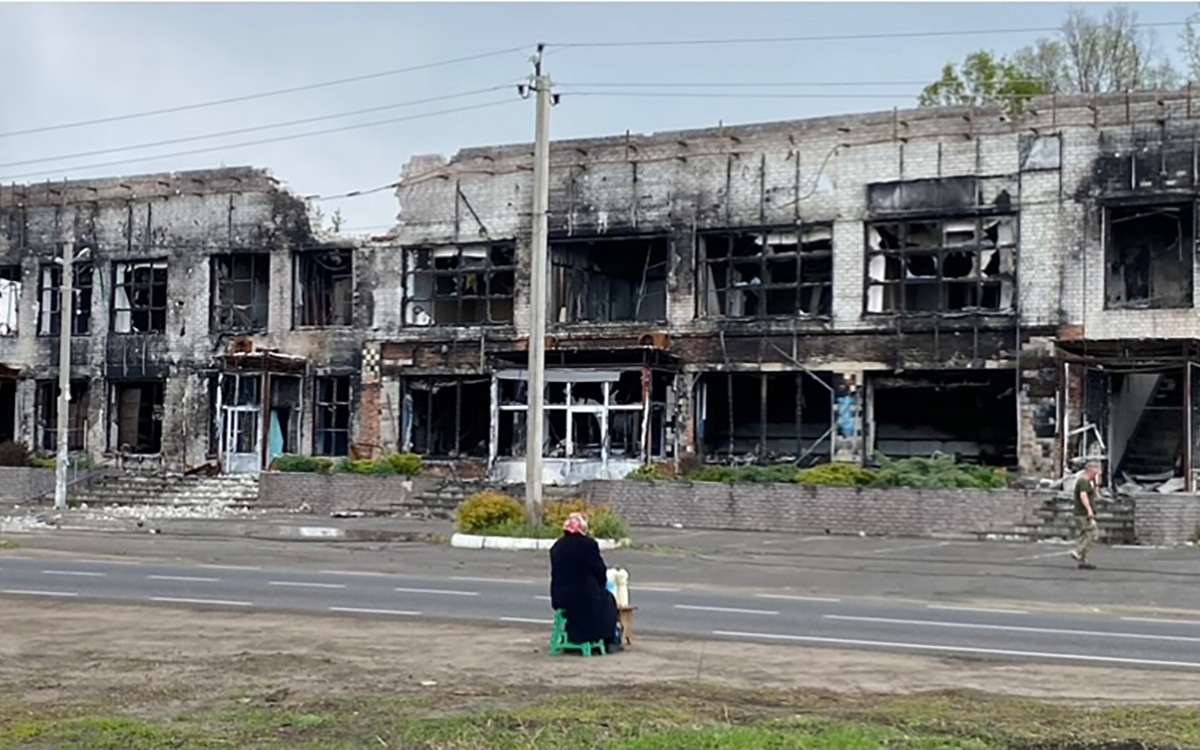
KHARKIV, Ukraine — Only 30 miles from the Russian border, Kharkiv is Ukraine’s second biggest city and was a key target of Russia’s invasion in February last year, when it was almost encircled.
I have been reporting regularly from Kharkiv since last year’s full-scale invasion, and the city is still often bombed by Russian missiles. United States government officials rarely come here because of the security situation. As temperatures plummet, Russia is targeting Ukraine’s heating infrastructure.
It hopes to make life unbearable for people in Ukraine’s cities and force another wave of mass movement out of Ukraine and into Poland and other European countries.
Attacks on Ukraine’s energy grid have begun, and some communities in the city have been particularly vulnerable since Russia’s invasion last year, and are facing a difficult winter.
Vasyl Malikov of the Kharkiv-based LGBTQI NGOs Alliance.Global and Spectrum Kharkiv has been distributing packages of hygiene goods, food and vouchers for humanitarian aid since last year. He helped to set up a new shelter for LGBTQI people and their relatives in the city.
“There are government shelters, and the authorities say they don’t discriminate against who uses them, but we know from lived experience that these official shelters aren’t always welcoming places for LGBTQI people. They feel vulnerable and are harassed there,” Malikov said. “We thought about setting up a shelter last year, but the situation seemed too uncertain and it wasn’t that easy to find premises, but we have gone ahead now and we can offer accommodation for up to 16 people to stay for up to three months.”
Some of those in the shelter are fleeing areas of conflict on the front lines, others have fled domestic violence, and others have been driven away by families who refuse to accept them. Some people, in Kharkiv for medical appointments, stay for days, others stay for weeks or months.
The shelter is a large apartment that has a kitchen and a large room where workshops and social events are held. It is on a block near a metro station which, Malikov says, is a useful place to run to in case of heavy bombardments.
Crucially, a new generator has arrived, which should heat the shelter during power outages. It’s a dual fuel model that can run on diesel or gas and costs around $2,000.
“This is a safe place for LGBTQI people and their families,” explains Malikov. “We shouldn’t have to set up our own facilities, the authorities should be doing this work, but we have to because they don’t.”
Other NGOs are also filling gaps that local authorities are failing to provide. The NGO Sphere has, since 2006 “been uniting women of Kharkiv, including lesbian and bisexual women.”
Tucked in a small office near the city center, some of Sphere’s activists described how their work has adapted to meet the challenges of the war.
“We’ve been providing aid for those forced to flee their homes because of the war,” says Yevheniia Ilinska, a long-standing member of the organization. “We’ve raised money from abroad — including from LGBTQ+ groups — to distribute basic supplies. We’ve been handing out clothes, including socks, and have provided some to our military.”
Sphere’s activists say that beyond its obvious damage and destruction to the city, the war is causing “a social revolution:” many men are away from their homes fighting in the military, and many family dynamics are changing dramatically.
The activists fear a spike in domestic violence when soldiers return home, a phenomenon witnessed in other countries.
“The full-scale war significantly aggravates some of the problems that existed before, including gender-based domestic and sexual violence, and discrimination at work,” Sphere notes on its website.
The war has also helped change some attitudes towards LGBTQ+ people in Ukraine. Last September, when the dangers from rocket attacks made an open-air parade impossible, Sphere helped organize a successful Pride event in the city’s metro system.
“We dressed wearing national symbols and LGBT flags,” says Ilinska. “And the public reception was very positive.”
The reaction is more evidence of a positive shift since last year’s invasion in public attitudes towards LGBTQ+ people, in part because the community’s contribution to the war effort is increasingly seen and valued. Hopes are high that Ukraine will soon legalize same-sex civic partnerships, and eventually same-sex marriages.
But for now, the cold is an immediate challenge. Sphere is raising funds to offer locals a safe place so that “in the event of rocket attacks and power outages, LGBTQ+ people will be able to stay warm indoors, have a hot drink, take a shower, and do laundry,” says Ilinska.
“We’re constantly adapting our work,” says Ilinska. “Adapting our advocacy and our public events, and our projects on targeting humanitarian aid. Kharkiv is changing and so are we, we have to react to this dramatic crisis, to the invasion, and we’re proving that we and our community can resist,” she said.
For more, see Human Rights First’s new report, Ukraine’s Winter War, written by Maya Fernandez-Powell and myself.
Eastern Europe
Transgender soldier from US named Ukrainian military spokesperson
Sarah Ashton-Cirillo was journalist before she enlisted
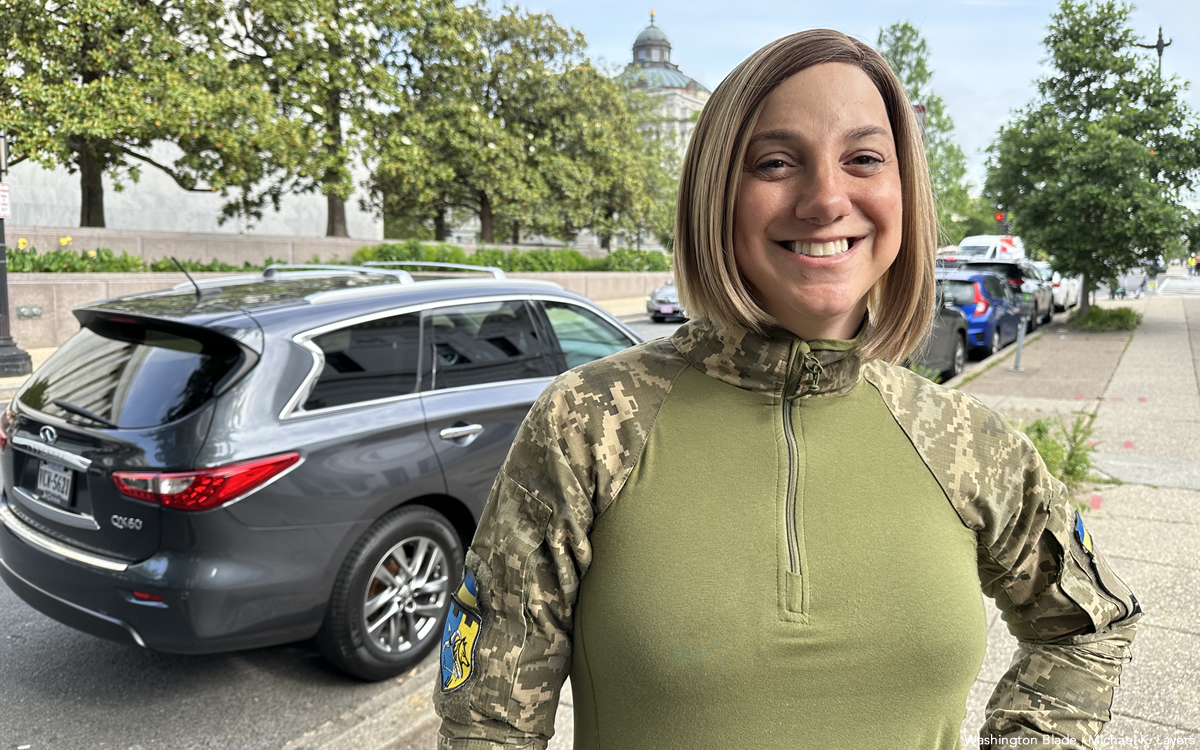
The Armed Forces of Ukraine have named a transgender soldier from the U.S. as one of its English-speaking spokespeople.
The Kyiv Post, an English-language newspaper, last week in a tweet noted Sarah Ashton-Cirillo “has become one of the speakers for the Defense Forces.” Deputy Defense Minister Hanna Malyar is among those who praised Ashton-Cirillo.
“Sara informs the English-speaking audience — she objectively covers the events of the Russian-Ukrainian war, debunks Russian fakes and propaganda,” said Malyar, according to the Kyiv Post. “Sarah’s audience reach on Twitter alone was 28.3 million users. So, the enemies get excited on hateful social networks, of course. However, this has only increased Sarah’s audience.”
Ashton-Cirillo was a journalist when she began to cover the Armed Forces of Ukraine’s Kharkiv Defense Forces at the beginning of Russia’s war against the country in 2022. She eventually enlisted, and a commander from the Defense Ministry on Jan. 31, 2023, facilitated her transfer to the unit’s 209th Batallion of the 113th Brigade.
Ashton-Cirillo, who was born in New York, was working as a senior combat medic in a trench near Kreminna in eastern Ukraine on Feb. 23, 2023, when shrapnel from an enemy artillery shell wounded her. Ashton-Cirillo suffered injuries to her right hand and to her face, and her fellow soldiers had to wait seven hours to evacuate her. Ashton-Cirillo eventually received treatment for her injuries in Kharkiv, Ukraine’s second-largest city that is roughly 130 miles northwest of Kreminna.
The Washington Blade spoke with Ashton-Cirillo in May while she was in D.C.
“The big key there was I wasn’t able to take any painkiller by staying in the trench because I was still technically in battle,” she recalled. “Seven hours after my injury, I finally got to a hospital.”
Ashton-Cirillo on Tuesday told the Blade her “new role within the Armed Forces of Ukraine is a position that has been earned due to my performance on the physical and informational battlefields.”
“What this means is that in today’s Ukraine being a part of the LGBTQ community is neither a benefit nor hindrance, but simply an accepted part of whom a person is,” she said. “The vocal support shown by LGBTQ groups in Ukraine, such as Gender Stream, Kyiv Pride and Ukraine Pride, upon news of this taking place, along with the statement of confidence in me issued by the Ukrainian Ministry of Defense and Deputy Defense Minister Hanna Maliar, made me understand that this battle for the country’s liberation is not about tolerance or acceptance for any one group but freedom and liberty for all Ukrainians.”
-

 District of Columbia5 days ago
District of Columbia5 days agoNew D.C. LGBTQ+ bar Crush set to open April 19
-

 South America3 days ago
South America3 days agoDaniel Zamudio murderer’s parole request denied
-

 Opinions5 days ago
Opinions5 days agoOpen or closed? No, not your bar tab
-

 Maryland4 days ago
Maryland4 days agoMontgomery County police chief discusses arrest of trans student charged with planned school shooting

